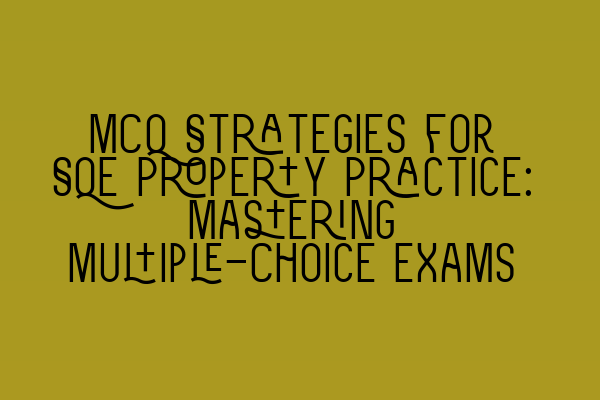MCQ Strategies for SQE Property Practice: Mastering Multiple-Choice Exams
Welcome to SQE Property Law & Land Law, where we provide expert insights and guidance to help you excel in your legal career. In this blog post, we will be discussing strategies to master multiple-choice exams in property practice. Whether you are a law student preparing for your SQE exams or a solicitor looking to refresh your knowledge, these tips will help you improve your exam performance and increase your chances of success.
Before we dive into the strategies, it is important to understand the format and structure of multiple-choice questions in property law. These questions typically consist of a stem, which is the actual question, and a set of options or choices. Your goal is to select the best answer from the available options. Sometimes, these options may include “all of the above” or “none of the above.”
Now, let’s explore the strategies that will help you approach property law multiple-choice questions with confidence.
1. Read the question carefully: Property law is a complex area, and multiple-choice questions can be tricky. Make sure to read the question stem carefully and understand what it is asking. Pay close attention to details and any keywords that could guide your answer.
2. Analyze each option: After reading the question, go through each option systematically. Sometimes, there may be a clear distinction between the options, while in others, the differences may be subtle. Consider the legal principles, statutes, and case law relevant to the question and eliminate options that do not align with these principles.
3. Identify key concepts and themes: Property law covers a wide range of topics, including ownership, conveyancing, leases, and land registration. Identifying key concepts and themes will help you approach questions strategically. For example, if the question revolves around adverse possession, you can focus on the essential elements and requirements of this doctrine.
4. Use the process of elimination: If you are unsure about the correct answer, use the process of elimination to narrow down your choices. Eliminate any options that are clearly incorrect, and focus on the remaining choices. This strategy increases your chances of selecting the correct answer even if you are uncertain.
5. Pay attention to the wording: The wording of the options can provide valuable clues. Look for words like “except,” “not,” or “always.” A single word can completely change the meaning of an option. Be vigilant and consider the context before making your selection.
6. Time management: Multiple-choice exams often have strict time limits, so time management is crucial. Allocate a specific amount of time for each question, and if you are unsure about an answer, make an educated guess and move on. Remember, unanswered questions will not earn you any points, so it is better to give your best effort within the allotted time.
By implementing these strategies, you can improve your performance in property law multiple-choice exams. However, it is equally important to supplement your study efforts with additional resources and practice materials.
To further enhance your knowledge and skills in contract law, we recommend exploring the following related articles:
1. Understanding Contractual Capacity: Rights and Limitations: Gain a deeper understanding of contractual capacity and the rights and limitations associated with it. [Link: Understanding Contractual Capacity: Rights and Limitations]
2. Interactive SQE Mock Tests for Contract Law: Test Your Knowledge: Test your contract law knowledge and gauge your readiness for the SQE exams with interactive mock tests. [Link: Interactive SQE Mock Tests for Contract Law: Test Your Knowledge]
3. Join Our SQE Contract Law Webinars: Expert Insights and Guidance: Participate in our SQE contract law webinars to receive expert insights and guidance from experienced professionals in the field. [Link: Join Our SQE Contract Law Webinars: Expert Insights and Guidance]
4. Contract Law Reforms: An Analysis of Recent Changes: Stay up-to-date with the latest contract law reforms and gain an in-depth analysis of the recent changes in this area of law. [Link: Contract Law Reforms: An Analysis of Recent Changes]
5. Parties in a Contract: Rights and Responsibilities: Explore the rights and responsibilities of parties involved in a contract and understand their legal obligations. [Link: Parties in a Contract: Rights and Responsibilities]
At SQE Property Law & Land Law, we are committed to providing comprehensive support and resources to help you succeed in your legal career. Stay tuned for more informative articles, expert insights, and study tips to excel in your property law journey.
Remember, practice makes perfect! Utilize these strategies, engage with our recommended resources, and put in the necessary effort to master multiple-choice exams in property practice. Good luck!
